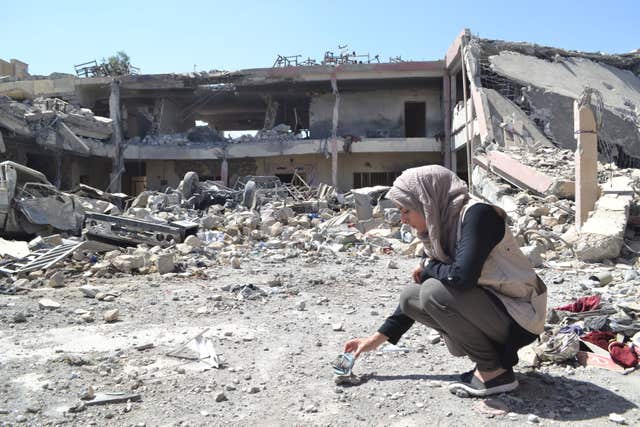
A British aid worker has described hearing “deafening explosions” and said the building she was in rattled when allied air strikes struck their Syrian targets.
In the wake of a suspected chemical attack in Douma last week, more than 100 missiles were fired in overnight raids on three facilities connected with the Syrian regime’s chemical weapons programme.
Prime Minister Theresa May, Donald Trump and Emmanuel Macron hailed the joint air strikes as a “success”, with the US president also describing them as “perfectly executed”.
Madiha Raza, who works for the British-based charity Muslim Aid, was on her third trip to the war-torn country when missiles struck a target just five miles from her hotel in Damascus.
Many thanks for messages and DM regarding safety here in #Syria. All is well where I am in Damascus although we woke up at 4am to our building shaking and extremely loud bombardments. Pray for those affected 💔 making the humanitarian situation worse. #damascus #دمش
— Madiha Raza (@Madz_Raza) April 14, 2018
The 29-year-old from Northwood, London, told the Press Association: “I was asleep and I woke up because of deafening explosions, which seemed as if they were right outside.
“I was just so perplexed because I did not know what was going on. I just could not believe how loud it was and the whole building rattled and the windows rattled.
“It continued for a good five minutes. As soon as I heard the first or second explosion I jumped out of bed and looked out of the window to see if I could see where it was or how far.
“I could see a bit of smoke but I couldn’t really see anything else as it was 4am – there were some sparks.”
Describing the explosions as coming “every few seconds” before they stopped, Ms Raza, who has worked in dangerous locations before including Mosul, Iraq, admitted it was an “unnerving” experience.
“I was here in February during the bombardment of eastern Ghouta, which is also just a few kilometres away from Damascus where I was staying, and that time I could hear it,” she said.
“But this one actually scared me… it was actually a very scary situation because of just how loud and close it seemed.”
Arriving in Syria on Thursday, Ms Raza said she knew there was a possibility of air strikes, but that she thought they were unlikely.
 Madiha Raza in Mosul, Iraq (Muslim Aid/PA)
Madiha Raza in Mosul, Iraq (Muslim Aid/PA)
“I also knew that if I was going to go I would be in the safe zone where most of the internally displaced people are actually arriving to, so I wasn’t so worried, but I wasn’t expecting it to happen as soon as it did,” she said.
Describing how life was normal in Damascus ahead of the air strikes, Ms Raza said that even after the bombing “life just goes on, it was like nothing had happened”.
Pressed on what the general feeling was like amongst Syrians following the strikes, she said: “I think people are annoyed, irritated – obviously it is a Western intervention and people don’t tend to like that.
“But because there weren’t casualties this time I think it was less chaotic than it would have been if there were.
“But I do know there were protests, one of the locals mentioned there were protests in some of the cities against the strikes.”
 An RAF Voyager taking-off on a sortie at RAF Akrotiri to conduct strikes in Syria (Cpl L Matthews/PA)
An RAF Voyager taking-off on a sortie at RAF Akrotiri to conduct strikes in Syria (Cpl L Matthews/PA)
Ms Raza had been in the country as part of Muslim Aid’s global coordinating team, working with World Federation Aid, to try to help those affected by the ongoing conflict.
Highlighting the “great humanitarian need in Syria”, she said: “It is a very sad situation in that there is a need for everything here.
“People are in need of shelter, nutrition, education, medical help – desperate in every way you can be. As humanitarians it has been very difficult to choose which areas you help in.”


Why are you making commenting on The Herald only available to subscribers?
It should have been a safe space for informed debate, somewhere for readers to discuss issues around the biggest stories of the day, but all too often the below the line comments on most websites have become bogged down by off-topic discussions and abuse.
heraldscotland.com is tackling this problem by allowing only subscribers to comment.
We are doing this to improve the experience for our loyal readers and we believe it will reduce the ability of trolls and troublemakers, who occasionally find their way onto our site, to abuse our journalists and readers. We also hope it will help the comments section fulfil its promise as a part of Scotland's conversation with itself.
We are lucky at The Herald. We are read by an informed, educated readership who can add their knowledge and insights to our stories.
That is invaluable.
We are making the subscriber-only change to support our valued readers, who tell us they don't want the site cluttered up with irrelevant comments, untruths and abuse.
In the past, the journalist’s job was to collect and distribute information to the audience. Technology means that readers can shape a discussion. We look forward to hearing from you on heraldscotland.com
Comments & Moderation
Readers’ comments: You are personally liable for the content of any comments you upload to this website, so please act responsibly. We do not pre-moderate or monitor readers’ comments appearing on our websites, but we do post-moderate in response to complaints we receive or otherwise when a potential problem comes to our attention. You can make a complaint by using the ‘report this post’ link . We may then apply our discretion under the user terms to amend or delete comments.
Post moderation is undertaken full-time 9am-6pm on weekdays, and on a part-time basis outwith those hours.
Read the rules here